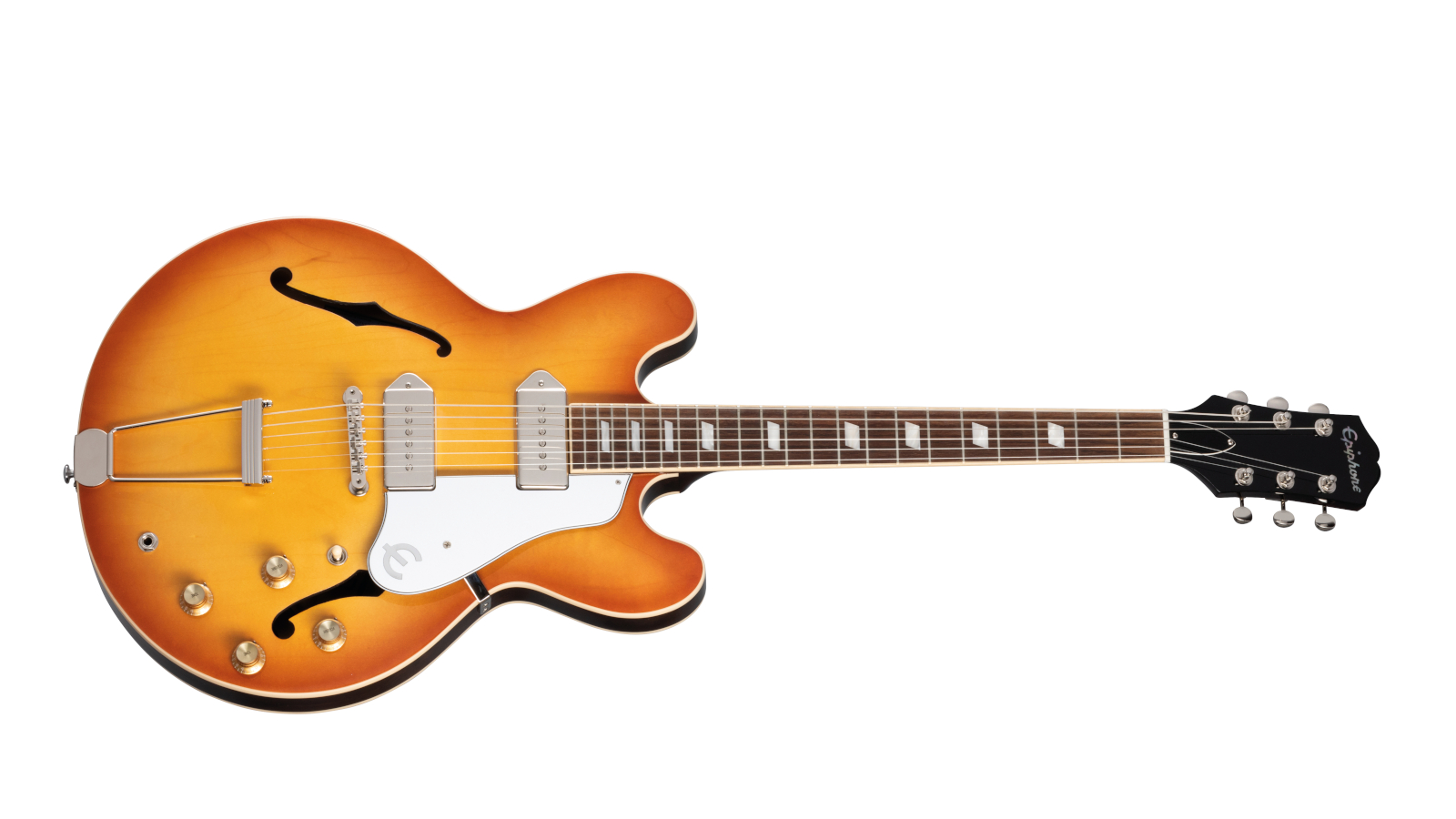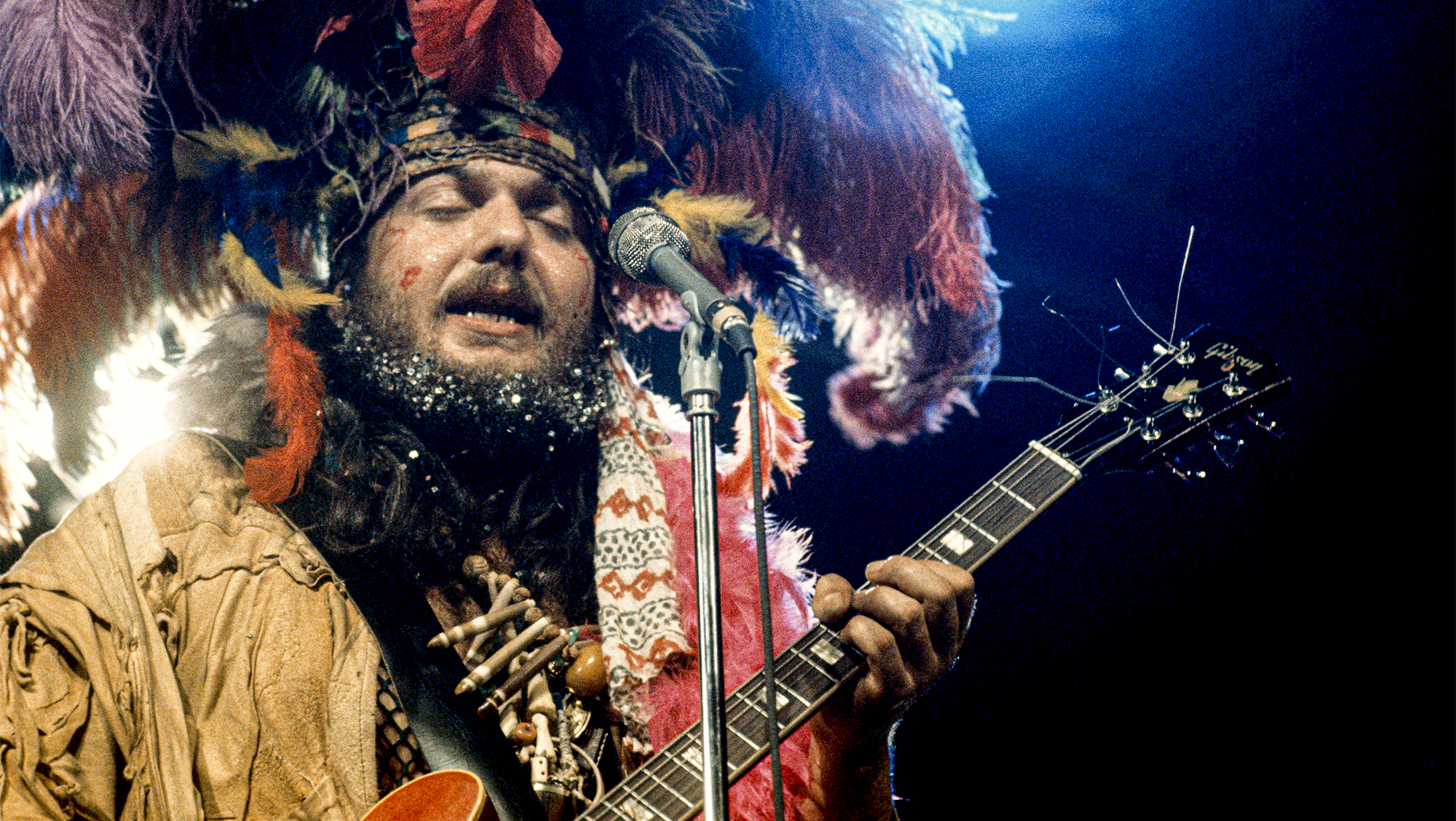GuitarPlayer Verdict
This American beauty is stunning to look at, a joy to play and record with, and an investment worth making whether you rock a mop-top or not.
Pros
- +
Lovely contours, classic looks and vibrant tones
- +
Great playability and classy appointments
Cons
- -
Rock and blues players who crank it up will need to learn how to dampen feedback
You can trust Guitar Player.
Our first impulse when picking up the handsome new USA-built Epiphone Casino was to play some Beatles, Oasis and Kinks riffs, and man, does it ever deliver that classic British rock sound: spanky, resonant and woody, with that touch of chambery depth that only a proper hollow-body guitar can really capture. Even unamplified, it’s unmistakable and iconic, and this new USA Casino – the first to be built in the U.S. since 1971 – absolutely nails what makes the Casino great. From McCartney to Weller to Gallagher, we know what a Casino can do, right?
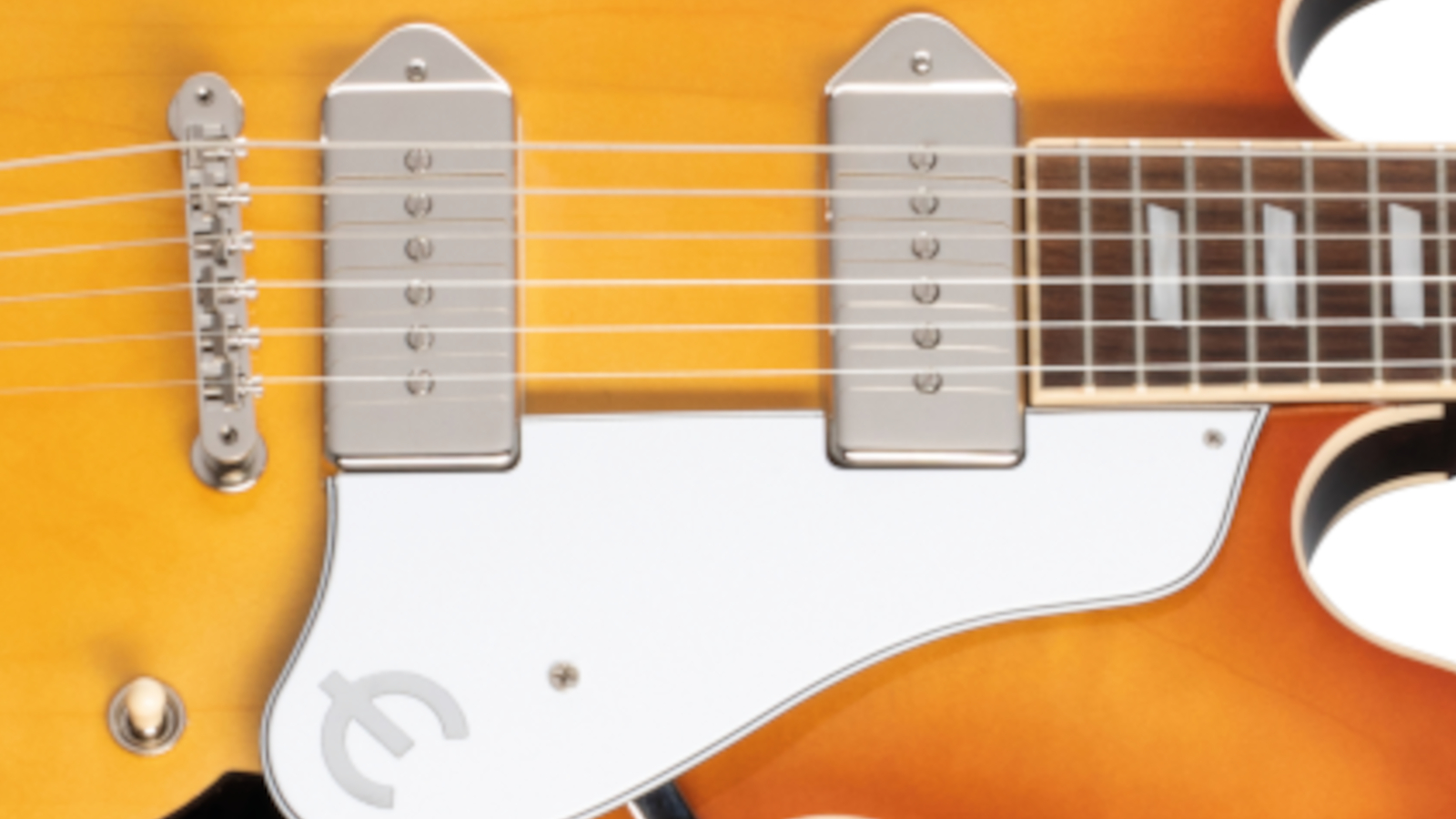
Well, it would be a mistake to continue to pigeonhole the Casino as strictly a guitar for British-inspired power pop, no matter how ably and powerfully it works in that context. That is especially true of a Casino as premium as this model, which is a huge improvement over more recent Asian-made Casinos. Keep in mind, this is essentially a Gibson 330-style guitar with high-output single-coil P-90 pickups, so while it’s naturally a little more wily and open sounding than, say, a 335, when played through a cranked tube amp, in most other contexts the Casino can ably handle a lot of the same basic territory, with a wild edge of its own.
Likewise, the two Gibson USA Dogear P-90 pickups here may not be some bluesmen’s first choice, though they’ve been a key go-to for T-Bone Walker, Freddie King and, lately, Gary Clark, Jr. and Joe Bonamassa. However, they give licks and rhythms a very pleasing midfrequency spread and a dynamic, hard-to-peg character, making the USA Casino a wicked electric blues guitar, full of character and punch, but with great detail and grit as well. (Ditto for non-Brit rock and roll. Look to the Strokes’ Nick Valensi for evidence of its stateside power.)
At lower volumes, or through clean-headroom amps like those made by Henriksen, AER, Brute and others, the USA Casino is a hip, lean alternative to a conventional hollow-body archtop for sets of jazz standards, with plenty of body and vintage character. Chime and punch? Sure, and plenty more.
Unboxing the light, captivating USA Casino was a treat from the outset, given the fairly luxurious Epiphone hard case that it ships with, and it just feels like the premium U.S.-built instrument it is. Our review model boasted the Royal Tan nitro lacquer finish and nickel pickup covers. (It also comes in a yummy Vintage Sunburst finish with black Dogear pickup covers.) Those two P-90s, mind you, are Gibson USA P-90s, featuring vintage-style braided two-conductor wiring, and they’re wax potted to minimize the potential for microphonic feedback. More on that in a minute.
The solid-mahogany, 22-fret, rounded-C neck shape is topped with an Indian rosewood fingerboard, kissed by those fantastic acrylic parallelogram fret inlays, and comfortably laid out with a 12-inch neck radius over a scale length of 24.75 inches. It’s an exceedingly comfortable neck and, even without any special setup, was balanced, with fine action and zero buzzing. It felt natural and smooth to fan out over the entire breadth of the fingerboard. In fact, perhaps due to the 12-inch radius, and assisted by the 1.69-inch Graph Tech nut, stretches from the 17th to 22nd fret translated as even and solid, whether for triads, double-stops or more-ambitious voicings.
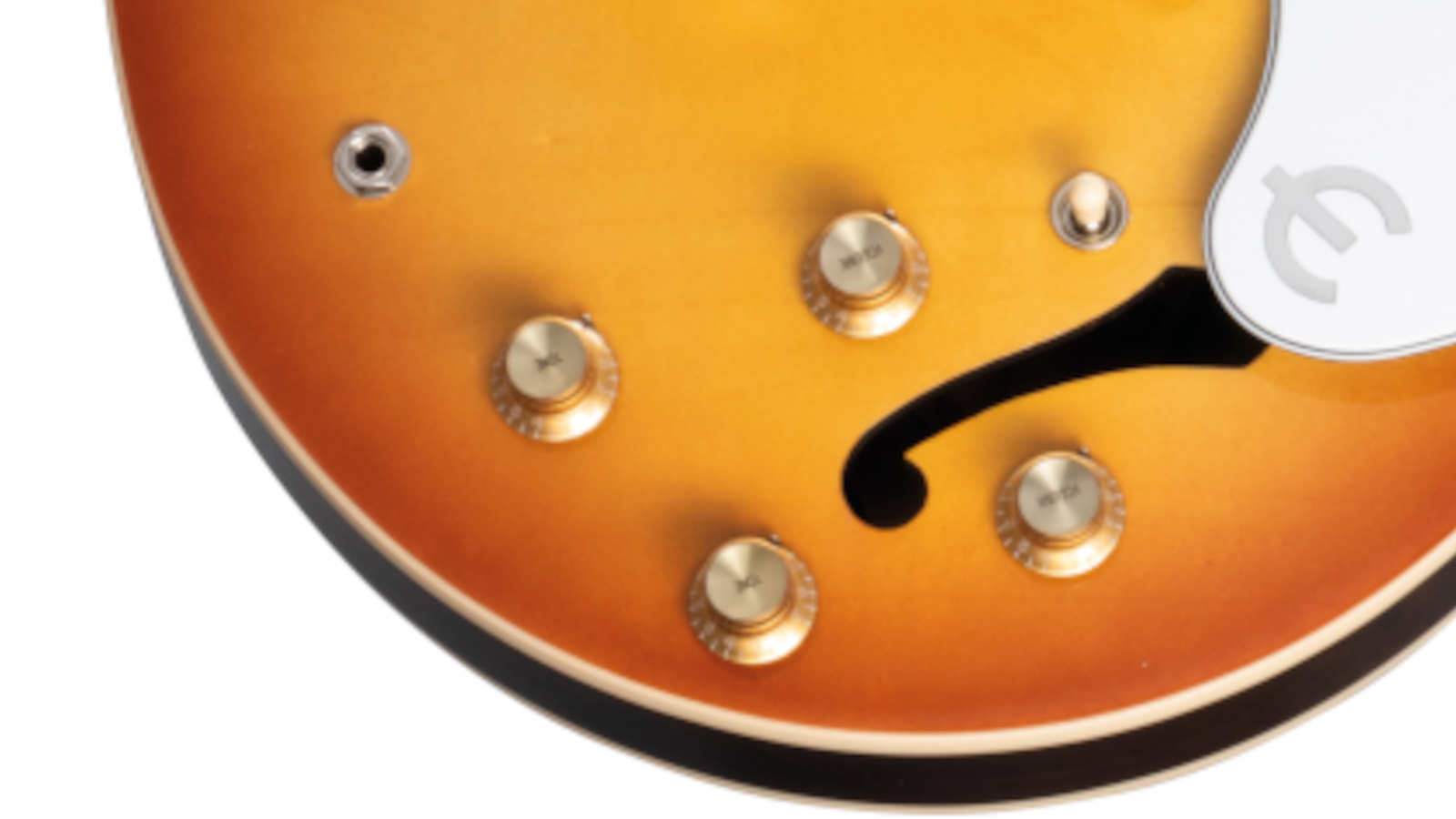
There’s also a nice way that the quarter-sawn spruce binding on the hollow body seems to “talk” to the neck as you play. Your left hand senses that this neck is attached to a slim hollow body, and so your hand is informed by that. It’s subtle, but noteworthy, and no doubt the Gibson ABR-1 Tune-o-matic bridge and Thinline Trapeze tailpiece play their roles in that, too. The artfulness of that body cut is palpable, as well. Perhaps that three-ply maple/poplar/maple top, back and sides just wanted to be carved, but there’s a contoured, roundness to the way the USA Casino feels tucked under your arm, and while not a small body, by any means, it doesn’t feel so big once you’re playing it. But man, it sure sounds big.
All the latest guitar news, interviews, lessons, reviews, deals and more, direct to your inbox!
We ran the USA Casino through three distinct amp rigs: a Victory V4 The Duchess with 1x12 Neodymium cabinet, a Suhr Badger 30 with 1x12 cabinet, and a Line 6 HX Stomp with various amp models chosen to reflect the vintage Vox amps with which the Casino really made its bones. In the case of the two tube amps, the sound was big and lively even clean, with the bridge position giving some nice subtle grit and the sound mellowing considerably on the middle blend and neck positions. The neck pickup is quite full in the lows and low mids. Roll the corresponding tone pot down just a little – one of four hand-wired controls with Orange Drop capacitors – and you’ve got a vintage jazz box in hand.
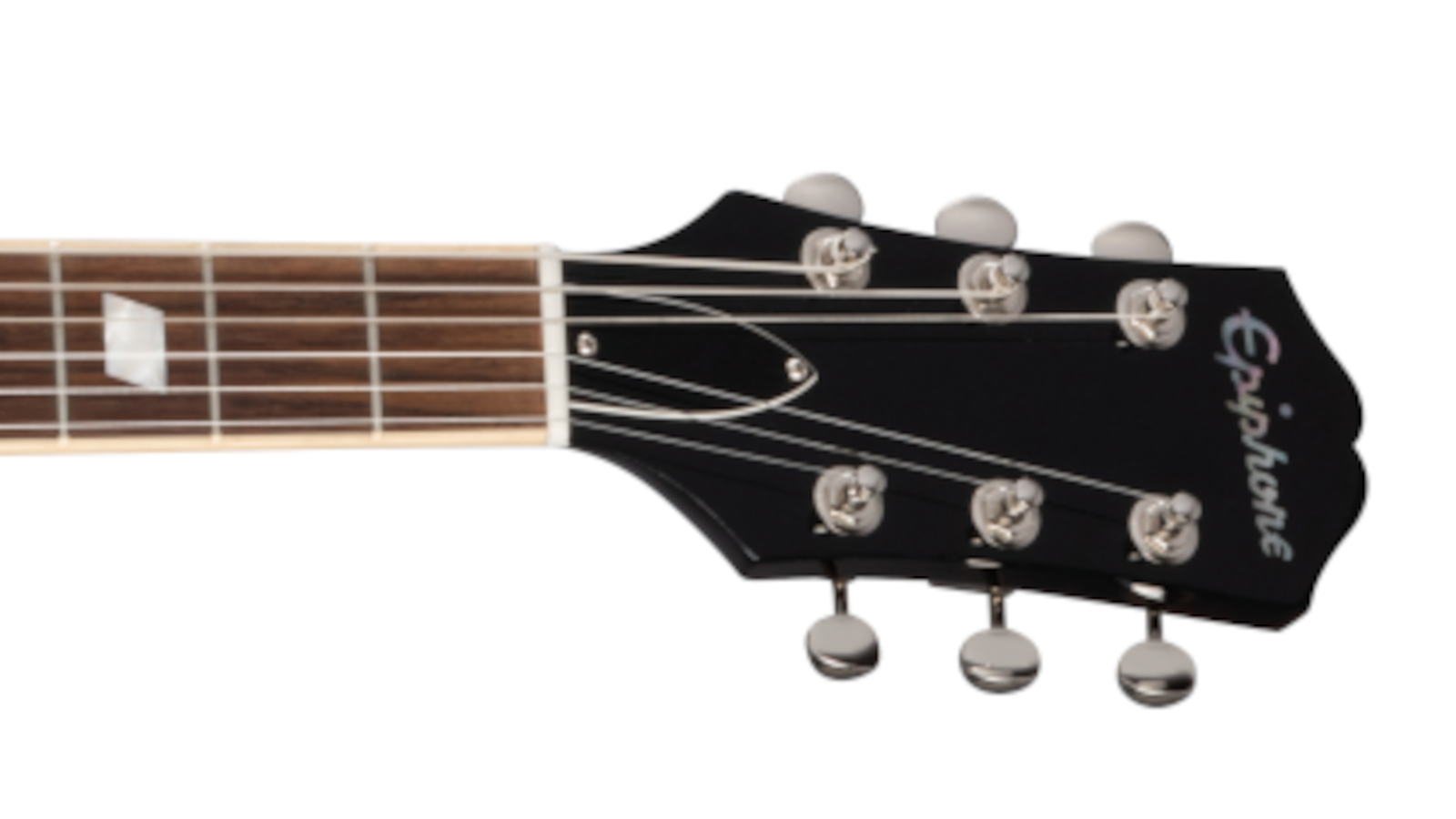
Despite knowing that the P-90s are wax potted, we were still concerned about possible microphonic feedback at louder volumes and with pedals. There is definitely some element of acoustic air in the sound, and especially with a distortion pedal on – in this case, switching from TS-9 to DS-1 to ToneBender-style sounds – you’re going to need to control this thing by judicious use of your right and left hands to dampen the strings. The plus side is that you’ve basically got a built-in EBow with this guitar – a little drive or fuzz, and you can sustain a note for days. The neck and body just vibrate. In other words, the guitar really talks and responds to the sound and vibrations coming out of your amp.
That said, we found the Casino to maintain its rich, spanky sound through the Line 6 HX Stomp’s various Vox-inspired amp models and a pair of studio monitors, though feedback was not an issue at all in that environment. From chugging Oasis-approved cowboy-chord rhythms to fat “Day Tripper”- style riffs, there was really nothing in the canon of British pop-rock that didn’t sound authentic with the USA Casino through a high-level amp modeler.
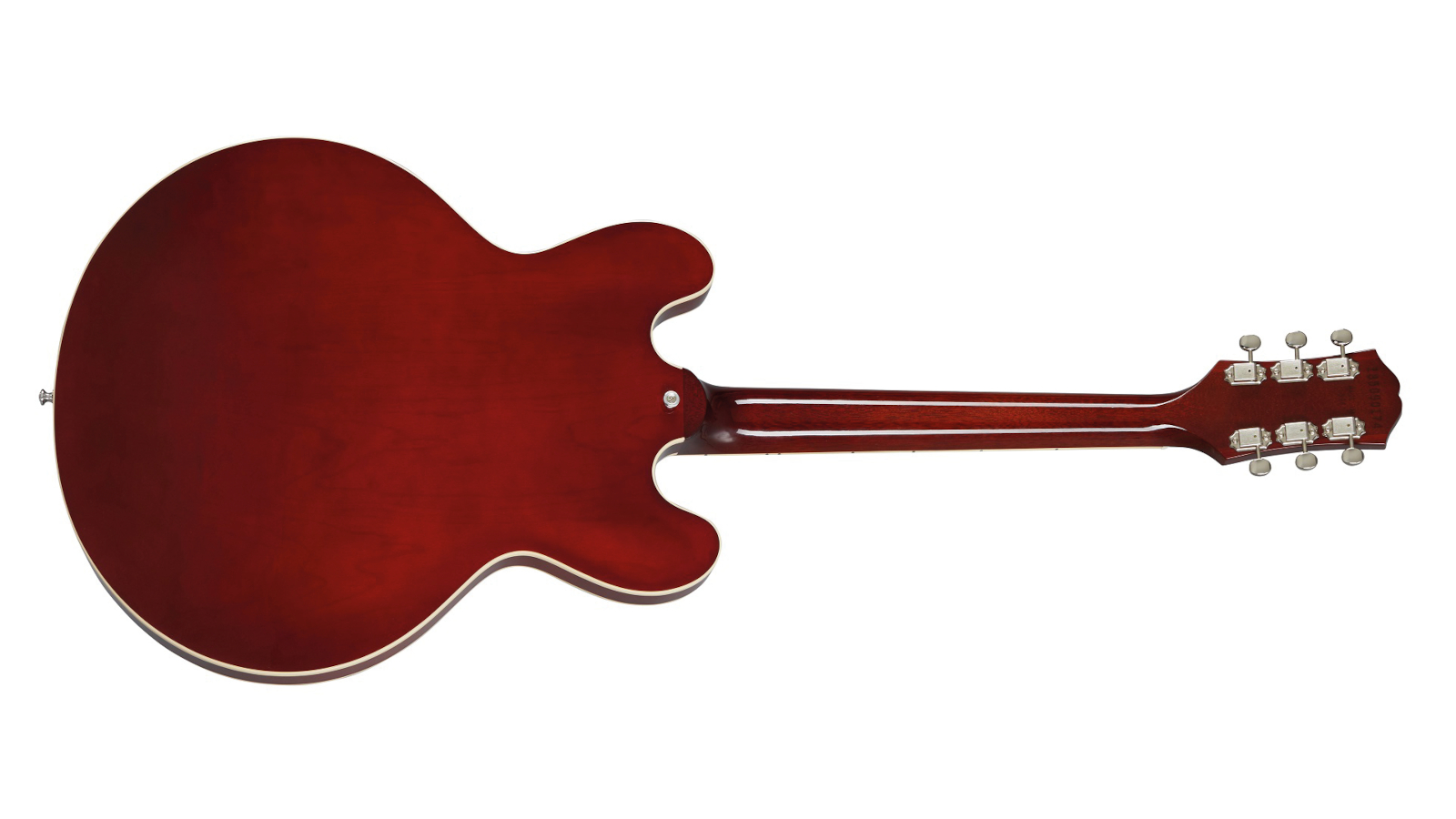
Gibson’s decision to reappraise the role of the Epiphone Casino in its product line, and to bring its manufacture back to the U.S., is no small matter. Before this year, you’d pay anywhere from $5,000 to $15,000 for a vintage USA-made Casino, as you’d be looking at a 1961 to 1970 model at the latest. As for the many lesser pre-2019 Epiphones knocked out by Gibson’s previous regime, you can easily find one for under $700, and they’re attractive enough and they’ll do the job.
Still, the new Epiphone USA Casino strikes us as an entirely reasonable deal if the Casino as a Platonic ideal is calling out to you. This American beauty is stunning to look at, a joy to play and record with, and an investment worth making whether you rock a mop-top or not.
Specifications:
- NUT WIDTH 1.69” bone
- NECK Solid mahogany
- FRETBOARD Indian rosewood, 24.75” scale, 12” radius
- FRETS 22 medium jumbo
- TUNERS Nickel-plated Vintage Deluxe
- NUT Graph Tech NuBone
- BODY 3-ply maple/poplar/maple with nitrocellulose lacquer finish
- BRACING Quarter-sawn spruce
- BINDING Single-ply cream
- BRIDGE/TAILPIECE Gibson ABR-1 Tune-o-matic with Thinline Trapeze tailpiece
- PICKUPS Gibson USA P-90 Dogear single-coil (x2)
- CONTROLS Volume (x2), Tone hand-wired with Orange-Drop caps (x2), 3-way toggle pickup switch
- FACTORY STRINGS Gibson .010–.046
- FINISHES Royal Tan (reviewed), Vintage Sunburst
- BUILT USA
A former editor at Guitar Player and Guitar World, and an ex-member of Humble Pie, Mr. Bungle and French band AIR, author James Volpe Rotondi plays guitar for the acclaimed Led Zeppelin tribute, ZOSO, which The L.A. Times has called “head and shoulders above all other Led Zeppelin tribute bands.” Find JVR on Instagram at @james.volpe.rotondi, on the web at JVRonGTR.com, and look for upcoming tour dates at zosoontour.com
